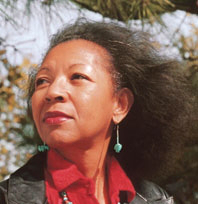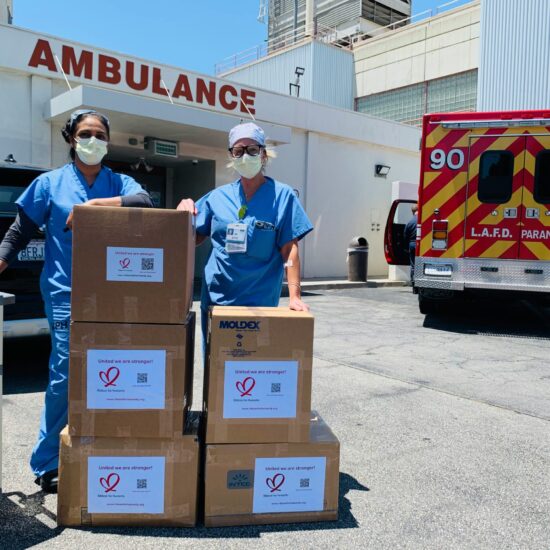
I recently came across “The Cancer Chronicles,” a four-part poem by a poet named Ai published in the online journal Cerise Press. Ai died of undiagnosed breast cancer earlier this year at age 62. I wasn’t aware of her work but had read her obituary, which described her as the “1/2 Japanese, 1/8 Choctaw, 1/4 Black, and 1/16 Irish” author of several books of poems, one of which won the National Book Award in 1999.
Ai’s poem (also included in the posthumous collection No Surrender) stunned me as good poetry often does: several times while reading it I had to stall the experience, look away and breathe for a moment, before going on. She names the sections of the poem after the four stages of cancer. In “Stage 1,” a woman performing a breast self-exam discovers … something. But she has no family history; it can’t be a lump, can it? “She let herself imagine she was free,” the poet writes in perfect iambic rhythm, the rhythm of life, of heartbeat—dah-DUM, dah-DUM, dah-DUM. But four years later, the tumor returns, a visibly distorting and disturbing presence.
“Stage 2” describes in unflinching language what it’s like to live in a miasma of self-delusion and dread:
She decided it was still worth being alive,
But that was before the skin tore
Where the tumor adhered to the wall of her chest
As she scrubbed herself in the shower.
This time she thought she really ought to see a doctor
As a trickle of blood ran down her chest,
But she calmed herself
And by the time she finished showering,
The bleeding had stopped.
After that, she felt free and healed.
“Poetry is the way we help give name to the nameless so it can be thought,” writes Audre Lorde in an essay called “Poetry Is Not a Luxury,” an idea Ai’s poem brings to mind. And it’s a notion that the health care professions have been warming to in recent years, a development that as a poet and a health care journalist I’ve noted with great interest.
Here are a few examples:
• Many colleges and universities have launched programs in the emerging field of medical humanities. The Center for Medical Humanities, Compassionate Care and Bioethics at Stony Brook University, for example, defines itself as “a place where the human side of medicine is elevated, examined, and revered,” in part through the study of literature.
• Columbia University’s master’s program in “narrative medicine” gives students opportunities for “close reading, literary analysis, reflective writing and ‘witnessing,’” all in the service of “the goals of medicine, public health, and social justice, as well as the intimate, interpersonal experiences of the clinical encounter.”
• Literature and Medicine: Humanities at the Heart of Health Care, “a national award-winning reading and discussion program for health care professionals that has been held in 25 states,” is offered in hospitals through the Maine Humanities Council.
• The Bellevue Literary Review, published biannually by the Department of Medicine at New York University’s Langone Medical Center, is the first literary journal to be affiliated with a hospital.
• Many nurses and physicians have explored the intersection of health care and literature. Poet and nurse Cortney Davis interviewed poet and physician Rafael Campo about, as Davis puts it, how “caregiving and writing poetry [share] the attributes of witnessing, healing, naming, and bringing about, if not cure, then wholeness.”
To me, Ai’s poem beautifully illustrates this premise. It’s no surprise that death arrives in “Stage 4” of “The Cancer Chronicles.” But in naming the nameless, the poem achieves something extraordinary. The speaker travels “the long road of suffering” with an open consciousness. Language lights the way and her readers follow, until she alone reaches the end and must “let go, let go.”
Senior Fellow Joy Jacobson, MFA, is a health care journalist, a medical editor, and a poet.









Pingback: Tweets that mention Health, Media, Policy … and Poetry « CHMP -- Topsy.com / December 7, 2010
/
Valerie Tate, RN / December 7, 2010
My favorite poem… so far… for nurses, by a nurse. Arithmetic of Nurses by Veneta Masson. Listen: http://www.youtube.com/watch?v=59Rw9BlhCfU. Find more at http://www.sagefemmepress.com/.
/
Diana Mason / December 7, 2010
Thank you, Joy and Valerie. On a day when my list of “to-do’s” exceeds the available minutes, I paused to be moved by your words and favorite poems. I love Veneta’s poetry and writing. It was centering to hear and see (s-s-s) her words about nurses in old men’s lives. The ‘abandoned old men’–so much more important than the lists.
/
barbaraglickstein / December 7, 2010
I too was moved all day from reading this poem and thinking about your words Joy. Thank you for this moving choice of poems and reminding all of us of the power of poetry.
Barbara
/
Thom Schwarz / December 8, 2010
“…give name to the nameless…” Ah, so that’s what it’s called! Not a poet, editor, or other, I am a nurse, a hospice nurse who tries to exorcise and explicate what I live with each night. Reading Joy’s recollection and paean to Ai is both exhilarating and comforting, and, yes, sad. Sad that I have not read her before now, sad that I could not meet her, at least not till later.
Thanks, Joy.
/
Joy Jacobson / December 8, 2010
Thanks, all of you, for your comments. Valerie, I appreciate hearing (and seeing!) Veneta Masson’s poem. It’s not always the case that graphics enhance the experience of a poem, but I was very moved by this. And Thom, Barbara, and Diana, it’s gratifying to know that Ai’s words have reached into and had an effect on your daily lives. Thanks for writing.
/